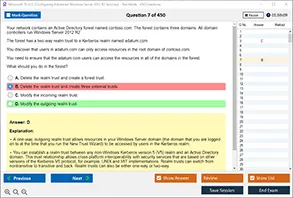A Comprehensive Guide for CompTIA A+ (220-1101) Certification
Printers are essential devices in both home and office environments, but they can sometimes produce faded or poor-quality prints. This issue can be frustrating, especially when you need high-quality documents or images. For IT professionals and those pursuing the CompTIA A+ (220-1101) certification, understanding how to troubleshoot and resolve printer issues like faded images is a critical skill. This article will provide a detailed guide on corrective actions for faded printer images, while also highlighting the importance of reliable study resources like Dumpsarena for CompTIA A+ exam preparation.
Introduction to Printer Troubleshooting
Printers are complex devices that rely on precise mechanical and software processes to produce high-quality prints. When a printer starts producing faded images, it indicates an issue with one or more of these processes. Troubleshooting printer problems is a key competency for IT professionals, and the CompTIA A+ (220-1101) certification exam includes questions on printer maintenance and troubleshooting.
Common Causes of Faded Printer Images
Before diving into corrective actions, it’s important to understand the common causes of faded prints:
- Low Ink or Toner Levels: Insufficient ink or toner can result in faint prints.
- Clogged Print Heads: Dried ink can block the nozzles, affecting print quality.
- Incorrect Print Settings: Low-quality print settings can lead to faded output.
- Poor-Quality Paper: Using incompatible or low-quality paper can affect print clarity.
- Dirty or Worn-Out Components: Dust, debris, or worn-out parts can impact performance.
- Driver Issues: Outdated or corrupted drivers can cause printing problems.
- Fuser Assembly Problems (Laser Printers): A malfunctioning fuser can lead to faded prints.
Step-by-Step Corrective Actions
1. Check Ink or Toner Levels
The first step is to ensure that the printer has enough ink or toner. Most printers display ink levels on their control panel or through software. If levels are low, replace the cartridge with a compatible one.
2. Inspect and Clean Print Heads
Clogged print heads are a common cause of faded prints. Use the printer’s built-in cleaning utility to clear blockages. For stubborn clogs, manually clean the print heads with a lint-free cloth and distilled water.
3. Adjust Print Quality Settings
Check the printer settings to ensure the print quality is set to "High" or "Best." Lower settings are designed for draft prints and may produce faded output.
4. Verify Paper Type and Quality
Using the wrong type of paper can affect print quality. Ensure the paper is compatible with your printer and is not damp or damaged. Adjust the paper type settings in the printer software if necessary.
5. Check for Clogged Nozzles or Dirty Components
Inspect the printer for dust, debris, or ink buildup. Clean the rollers, nozzles, and other components using a soft cloth and isopropyl alcohol.
6. Update or Reinstall Printer Drivers
Outdated or corrupted drivers can cause printing issues. Visit the printer manufacturer’s website to download and install the latest drivers. If the problem persists, uninstall and reinstall the drivers.
7. Perform a Printer Calibration
Printer calibration ensures that colors and alignment are accurate. Use the calibration tool in the printer software or follow the manufacturer’s instructions.
8. Inspect the Fuser Assembly (Laser Printers)
In laser printers, a faulty fuser assembly can cause faded prints. Inspect the fuser for wear and tear and replace it if necessary.
9. Replace Worn-Out Components
Over time, printer components like rollers, belts, and cartridges wear out. Replace these parts to restore print quality.
Preventive Maintenance Tips
To avoid faded prints and other printer issues, follow these preventive maintenance tips:
- Regularly clean the printer and its components.
- Use high-quality ink or toner cartridges.
- Store paper in a cool, dry place to prevent moisture damage.
- Update printer firmware and drivers regularly.
- Perform routine printer maintenance, such as head cleaning and calibration.
How does CompTIA A+ (220-1101) Cover Printer Troubleshooting?
The CompTIA A+ 220-1101 exam dumps include a section on printer troubleshooting, covering topics such as:
- Identifying common printer issues (e.g., faded prints, paper jams, connectivity problems).
- Understanding printer components and their functions.
- Performing maintenance and repairs.
- Configuring printer settings and drivers.
Mastering these skills is essential for IT professionals, as printers are a common component of workplace technology.
Why Choose Dumpsarena for CompTIA A+ Exam Preparation?
Preparing for the CompTIA A+ (220-1101) exam requires reliable study materials and practice tests. Dumpsarena is a trusted platform that offers:
- Comprehensive Study Guides: Detailed explanations of exam topics, including printer troubleshooting.
- Practice Questions: Realistic practice tests to help you assess your knowledge.
- Up-to-date Content: Regularly updated materials to align with the latest exam objectives.
- Expert Support: Access to experienced professionals for guidance and clarification.
By using Dumpsarena, you can confidently prepare for the CompTIA A+ exam and gain the skills needed to troubleshoot printer issues effectively.
Conclusion
Faded printer images can be caused by a variety of factors, from low ink levels to hardware malfunctions. By following the corrective actions outlined in this guide, you can diagnose and resolve the issue efficiently. For IT professionals pursuing the CompTIA A+ (220-1101) certification, mastering printer troubleshooting is a valuable skill that will enhance your career prospects. To ensure success in your exam preparation, leverage trusted resources like Dumpsarena, which provides comprehensive study materials and practice tests tailored to the CompTIA A+ curriculum.
By combining practical troubleshooting skills with thorough exam preparation, you’ll be well-equipped to handle printer issues and excel in your IT career.
CompTIA A+ 220-1101 Practice Test Free Download: Next Question → What Would Cause An Inkjet Printer To Fail To Print Any Pages?
Question 1. What is the FIRST step to take if a printer is printing faded images?
A. Replace the printer entirely
B. Check the ink or toner levels
C. Restart the computer connected to the printer
D. Update the printer drivers
Explanation: Faded images are often caused by low ink or toner levels, so this should be checked first.
Question 2. Which of the following could resolve faded printing if the ink levels are sufficient?
A. Clean the printhead nozzles
B. Replace the printer paper
C. Adjust the printer's network settings
D. Reinstall the operating system
Explanation: Clogged printhead nozzles can cause faded prints, and cleaning them can restore print quality.
Question 3. What should you do if the printer continues to print faded images after replacing the toner or ink cartridge?
A. Check the paper type and quality
B. Replace the printer's power cable
C. Reset the printer to factory settings
D. Increase the printer's print speed
Explanation: Using the wrong type of paper or low-quality paper can affect print quality, causing faded images.
Question 4. Which printer setting adjustment can help resolve faded printing issues?
A. Increase the print density or darkness setting
B. Change the paper size setting
C. Enable duplex printing
D. Disable the printer's Wi-Fi connection
Explanation: Adjusting the print density or darkness setting can help improve the visibility of printed images.
Question 5. If a laser printer is producing faded prints, what component should you inspect?
A. The fuser unit
B. The paper tray
C. The USB cable
D. The printer's display panel
Explanation: In laser printers, a worn-out or malfunctioning fuser unit can cause faded prints.




